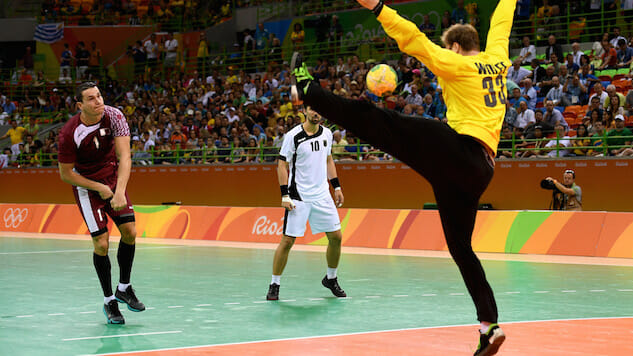How Qatar Bought its Way Into the Olympics
Photos courtesy Getty Images Olympics Features the olympics
Is Žarko Markovic a Qatari name? Depends on who you ask, but for the purposes of the Olympics – and according to his passport – the answer is “yes.”
Markovic, a Montenegrin-born right back on the Qatari Olympic handball team, and all but three of his teammates – as well as at least 23 of the nation’s 39 Olympic athletes – became a Qatari citizen virtually overnight.
Qatar and its handball team, which consists mostly of veterans who were born in Europe and had illustrious careers there, are the latest to take advantage of a simple fact: though the International Olympic Committee demands those who compete for a country be citizens thereof, it can’t dictate how one becomes a citizen, or whom the country naturalizes.
All the Olympic Charter says on the subject is that 1) an athlete must be a national of the country for whom he or she competes and 2) three years must have passed since he or she last competed for a different country.
The math whizzes amongst you will note that the Olympics happen on four-year cycles, meaning athletes can compete in consecutive Games for different countries.
When you think about it, it’s only fair that immigrants be allowed to represent their adoptive homes. Oftentimes, an athlete will have relocated as a child or when they married, and those people can hardly be faulted for feeling a connection to their adoptive homelands.
Triple jumper Yamile Aldama, for example, had represented her native Cuba in the Olympics prior to marrying a Scottish man, who was subsequently arrested for heroin trafficking and sentenced to 15 years in prison. She continued to live in the United Kingdom with her son, a British citizen by birth, but bureaucracy kept her from being naturalized and joining the UK Olympic team. Several medal-hungry nations courted her, and she eventually elected to represent Sudan at the Sydney games, finding that nation’s naturalization process a bit easier to navigate.
In 2012, the paperwork having gone through, she competed as a Brit, her third and, presumably, final nationality.
Other times, the athlete simply feels it’s time to make a change. Speed skater Viktor Anh, born Anh Hyun-soo, competed in two Olympics for his native South Korea, winning three gold medals and a bronze in Turin in 2006. After falling out with his coaches and teammates and failing to qualify for Vancouver, he gained Russian citizenship in 2011 and won three more golds and another bronze for his new country at Sochi.
This isn’t even the first time it’s happened on a large scale. About half of Azerbaijan’s 2012 squad was composed of freshly-minted Azerbaijanis, at least two of whom were reportedly paid over $500,000 by their grateful new countrymen. 11 American-born UK citizens were amongst the 60 “Plastic Brits,” foreign-born athletes who were derided by the English media for representing the hosts at London 2012.
In the case of Qatar, it was a foregone conclusion that the team needed to buy some ringers, but in most cases a hasty naturalization puts someone who was recently a foreigner in a spot that would otherwise have been filled by a native. Some argue that this practice is good for Sport, as it ensures that the very best athletes will be at the Olympics, with the best in the world spilling over from larger talent pools into those of less-talented nations.
(Check out Paste’s story about Jefferson Santos Pereira, a Brazilian-born volleyball star in Qatar)
Others point out that there’s probably something somewhere in the Olympic Charter about “fairness” and the “spirit of international competition,” but as we’ve seen in Rio, they may be losing the fight.
Though they’re not the first, Qatar have certainly been the most willing to part with those ideals, handing out passports like the IOC hands out condoms. This comes as no surprise to anyone who’s been following Qatar’s sporting development in recent years.
Sheikh Jassim bin Hamad bin Khalifa al Thani, the older brother of the Qatari emir, was originally Qatar’s heir apparent. Instead, he has given developing Qatari sports his undivided attention. That, and a lot, lot, lot of money.
Hence the Aspire Academy. Qatar has scooped up dozens of talented youngsters from across the globe and brought them to live and train at this state-of-the-art, all-expenses-paid soccer facility, with the hopes that the athletes will one day repay their benevolent hosts by electing to play for the Qatari national soccer team.
Getting them citizenship, I’m wagering, won’t be too much of a problem.
FIFA regulations, however, require a player to have lived in a country for five years before representing it on the international stage. They also stipulate that a player can only represent one nation at the senior level, ever. So when it comes to soccer, Qatar must play the long game.
With handball, however, and with other Olympic sports, all Qatar has to do is throw money at players whose international careers would otherwise be coming to a close.
Does this all leave a bad taste in the mouth? Sure, especially when you toss in the fact that Qatar paid Spanish fans to cheer on their team at last year’s World Men’s Handball Championship, hosted in – wait for it – Doha, Qatar.
Qatar’s ringers did well at that tournament, coming in second to France, who beat them again in Rio on Tuesday. The French have criticized Qatar’s purchases, particularly that of former French international Bertrand Roiné.
They should be careful, though. The French side includes a number of athletes who play for, have played for, or may hope to play for superclub Paris Saint-Germain. And who owns PSG?
Why, that would be the Qatar Investment Authority.